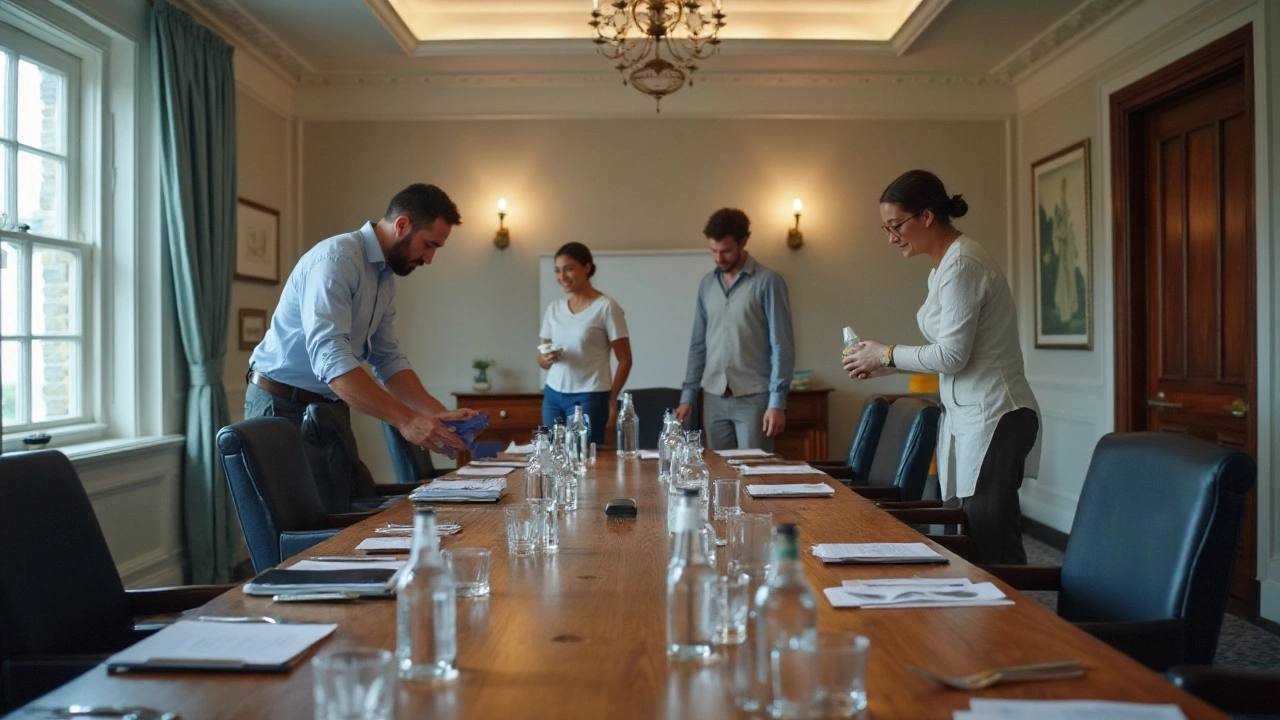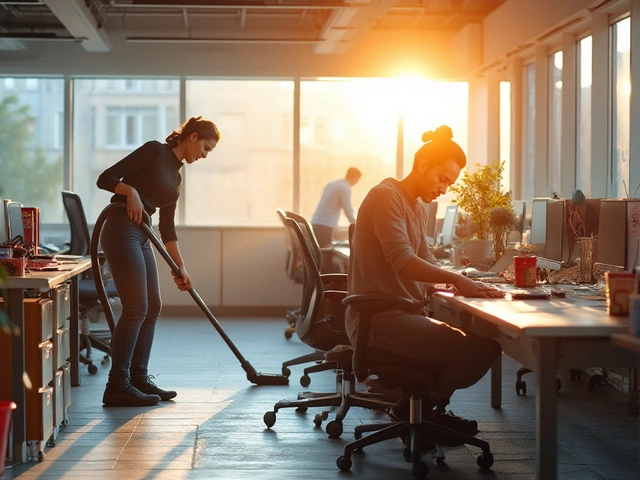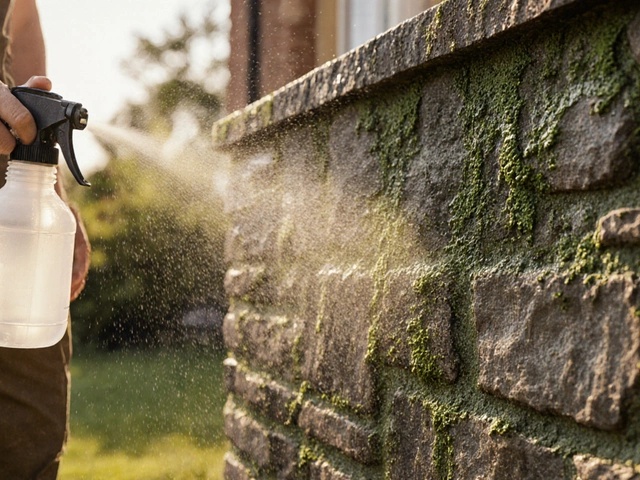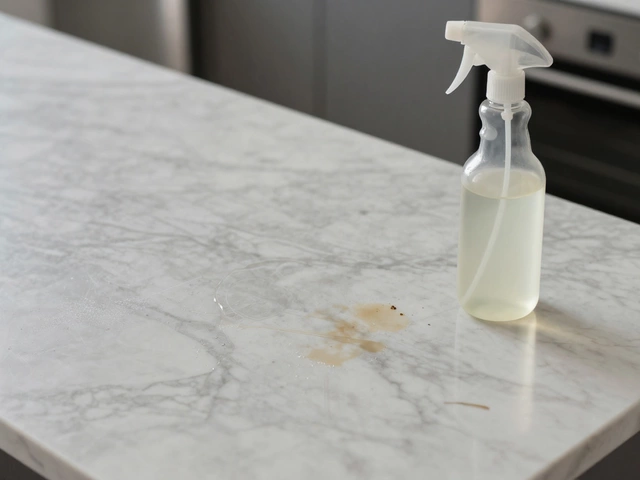In today's ever-evolving workspace, cleanliness is often overlooked but remains a cornerstone of efficiency and health. The neatness of an office isn't just about appearances; it's about creating a productive and inviting environment for everyone who steps through the door.
While the question of who takes responsibility for cleaning often arises, it's more about teamwork than assigning blame. Each member of the office plays a part, whether they're handling tasks directly or coordinating with professional cleaning services.
As we traverse the topic of office cleaning responsibilities, we'll uncover the nuances of different roles, the benefits of hiring experts, and practical tips to ensure every corner sparkles. It's not just about dusting off surfaces; it's about fostering a culture of pride and shared effort in keeping the workspace pristine.
- Understanding Office Cleaning Needs
- Roles and Responsibilities
- Hiring Professional Cleaning Services
- Incorporating Cleaning into Office Culture
- Tips for Daily Office Maintenance
Understanding Office Cleaning Needs
Office cleaning is not a one-size-fits-all endeavor. Each workplace has its own unique set of needs and challenges, heavily influenced by factors like the size of the office, the number of employees, the type of business, and the amount of foot traffic it encounters daily. A bustling tech firm with hundreds of employees will naturally have a different cleaning regimen compared to a small accounting practice that operates with a handful of staff. Recognizing these variations is the first step in crafting an effective office cleaning strategy that meets specific hygiene and aesthetic goals.
A common misconception is that cleaning simply involves sweeping, mopping, or dusting; however, the needs are far more complex. Regular disinfection of shared surfaces, particularly in communal areas such as kitchens, restrooms, and conference rooms, is critical to prevent the spread of germs and illnesses. Research shows that office desks can host more bacteria than a toilet seat, making them a key focus area for any cleaning routine. Additionally, addressing the air quality by cleaning vents and filters is an often-overlooked aspect that significantly contributes to a healthier work environment.
Depending on the nature of the business, there might be specific cleaning tasks that are paramount. For instance, IT companies often have sensitive equipment that needs careful dusting, while medical offices require stringent sanitation practices to comply with health regulations. An important consideration is the scheduling of cleaning activities. High-traffic areas, such as entrances and break rooms, may require attention multiple times a day, while other areas might suffice with a weekly clean. Balancing these needs influenced by timing and specific tasks ensures minimal disruption to the workflow.
"A clean workspace is not just about hygiene, but about morale," states Jane Patel, an expert on workplace productivity and wellness. "Employees are more likely to feel valued and motivated in an environment that shows the company cares for their well-being."Meeting office cleaning needs effectively can also significantly reduce absenteeism due to illness. According to a study published by the American Journal of Infection Control, meticulous and regular cleaning routines can drastically decrease the rate of infectious diseases in an office setting. This not only safeguards the health of employees but also culminates in tangible financial benefits through reduced sick days and higher productivity levels. By being proactive and understanding the diverse cleaning requirements, organizations can foster a safe, healthy, and engaging atmosphere that is conducive to both employee satisfaction and business success.
Lastly, let's not forget about the environmental impact of the cleaning methods employed. The modern office is increasingly becoming cognizant of eco-friendly practices, including minimizing waste and using non-toxic, biodegradable cleaning products. By investing in green cleaning solutions and educating staff on sustainable practices, a company not only ensures a safer workspace but also plays a part in broader environmental stewardship. Adopting a thoughtfully structured cleaning program that addresses these concerns reinforces a company's commitment to social responsibility while promoting a culture of cleanliness.
Roles and Responsibilities
Understanding the distribution of cleaning duties in an office extends beyond assigning tasks to the janitorial staff. In today's dynamic work settings, everyone plays a vital role in maintaining the cleanliness of their workspace. Let's face it, a spilled coffee cup can create a sticky situation unless someone takes initiative. For small businesses, defining these roles can be more flexible, yet it requires clear communication and agreement among the team. Larger organizations might rely on professional services, but each employee is expected to tidy their immediate work area. In a sense, the responsibility for a clean office is a collaborative effort, involving both personal accountability and coordinated team efforts. A healthy workplace culture is one where tidiness and hygiene are not luxury, but shared values.
Janitorial services, whether in-house or contracted, handle the bulk of the cleaning. These professionals ensure that common areas, bathrooms, and break rooms are spotless. Investing in trained personnel guarantees a level of expertise that cannot be overlooked. According to a study published in the Journal of Facility Management, companies that employ professional cleaners report a 20% increase in workplace satisfaction and productivity. However, these professionals aren't omnipresent, meaning employees must engage in keeping their immediate workspace in order. This means returning discarded papers to recycling bins and maintaining a crumb-free desk, which ultimately contributes to the larger goal of workplace cleanliness.
Sharing the cleaning responsibilities among employees promotes a sense of ownership and pride in the workplace. Encouraging staff to clean their space before leaving for the day not only ensures a welcoming environment in the morning but also sets a positive example. One might consider implementing scheduled cleaning days where teams can work together to spruce up common areas, boosting morale along the way. A quote by A.J. Jacobs resonates well in this context:
"By tidying up their workspaces, employees not only bring order to their cubicles but also gain a sense of control over their environment, which can have tremendous psychological benefits."Such initiatives demonstrate that maintaining a pristine office is a shared responsibility, uniting individuals for a common cause.
Lastly, the facilities manager plays a pivotal role in organizing and overseeing cleaning protocols in larger offices. Their duties span regular inspections and restocking cleaning supplies to managing wider initiatives. An efficient manager ensures that all cleaning operations are well-coordinated, while also fostering open communication channels for staff feedback. They are the decisive link between administrative directives and the actionable tasks that lead to a clean office. Gathering feedback on cleaning effectiveness allows them to make informed improvements, ensuring that the office remains a pleasant and productive place for all.

Hiring Professional Cleaning Services
Let's face it, while keeping an office clean sounds simple, it often requires more expertise and effort than expected. When the list of tasks includes not just vacuuming and dusting, but deep cleaning carpets, sanitizing restrooms, and ensuring workspace hygiene, it might be time to consider hiring professional cleaning services. These professionals have one main job: to ensure that your office space is not only clean but also adheres to health and safety regulations.
Professional cleaning services bring expertise and experience to the table that often goes beyond what regular employees can manage during their workday. Many cleaning companies are equipped with industrial-grade machinery and cleaning agents that help in thoroughly maintaining floors, carpets, and other surfaces. The equipment they use isn't just for cleaning; it minimizes the spread of illness-causing germs, which can severely impact workplace productivity. In fact, workplace hygiene can drastically affect employee well-being, with statistics from various studies showing a correlation between cleanliness and reduced sick days.
One of the significant benefits of hiring professionals is their flexibility. Most companies offer customizable cleaning plans tailored to the specific needs of your business. Whether you require daily maintenance or monthly deep cleanings, these services can adjust to fit your schedule and budget. Moreover, a clean office environment is often noted by both employees and visitors, dramatically increasing first impressions and potentially improving employee satisfaction over time.
Ensuring Quality Service
When choosing a professional service, it's important to do your homework. Research different companies, check reviews, and perhaps even request references. It can be helpful to meet with representatives to discuss your office needs so you can be assured that the service can meet expectations. Transparency about what services are offered, how frequently, and at what cost should guide your selection process. As someone once wisely remarked in a business journal,
"A clean office isn't just about looking sparkling; it’s fundamental to a successful business strategy."
| Company Type | Services Offered |
|---|---|
| Small Businesses | Basic cleaning, dusting, vacuuming |
| Corporate Offices | Deep cleaning, carpet shampooing, window cleaning |
| Industrial Spaces | Waste management, hazardous material handling |
Incorporating professional cleaning services can be a game changer for many offices. By allowing staff to focus on their core duties without the distraction of cleaning tasks, productivity can flourish. Hiring professional cleaners can lead to a safer, healthier, and more orderly work environment. Thus, investing in these services is inviting efficiency and taking a proactive stance towards workplace well-being.
Incorporating Cleaning into Office Culture
To truly embody a clean and productive environment, offices must weave cleanliness into the very fabric of their organizational culture. It's about cultivating an atmosphere where all employees, regardless of their position, understand and prioritize the importance of a tidy workspace. Establishing this mindset isn't an overnight venture; rather, it involves a gradual transformation, acknowledging that a clean office is not just a duty but a shared value. Leaders in the office need to set examples by participating in cleaning duties, demonstrating that cleanliness is an integral part of everyday operations rather than an afterthought.
Effective communication is a cornerstone of incorporating cleaning into office culture. Regular meetings or memos that emphasize the critical role of workplace hygiene can reinforce this ethos. Providing practical insights and guidelines on maintaining cleanliness can inspire employees to contribute meaningfully. Many successful organizations have seen a considerable rise in morale when employees are given the autonomy and responsibility to keep their environment clean. Highlighting cleaning as a collective effort can build camaraderie and pride, ensuring that everyone is on the same page.
Additionally, rewards and recognition can bolster this cultural shift. Setting up a system where individuals or teams are acknowledged for their contributions to maintaining a tidy office can incentivize others to step up. It could be something as simple as public recognition during meetings or small rewards for consistently tidy workspaces. Strategic incorporation of cleaning tasks into everyday routines can also be significantly beneficial. Encouraging brief clean-up times at the end of the day can instill habits that become second nature and require minimal effort over time.
Education also plays a vital role in embedding this culture. Offering workshops and training sessions on the importance and techniques of cleaning can empower employees with the knowledge and skills they need. It’s not always apparent to everyone how to clean efficiently, and providing formal guidance can bridge that gap. In some tech-forward companies, digital reminders and gamification are used to encourage cleaning, providing gentle nudges that turn chore into choice.
"The greatest wealth is health," as Virgil famously said, reminding us that maintaining a clean work environment is pivotal for our collective well-being.
Moreover, integrating sustainable cleaning practices into office culture can resonate with environmentally-conscious employees and align with broader corporate responsibility goals. Choosing eco-friendly products and reducing waste reflect a commitment to the planet, fostering a deeper connection not just internally, but with clients and stakeholders who value sustainability. By prioritizing cleaning duties and demonstrating commitment, offices send out a clear message about their values and who they are as a community. By embedding these values at the core, offices can transform cleaning from a mundane task to a proud culture point.
Finally, facilities that provide the necessary resources and materials make it easier for everyone to participate in keeping the office clean. Easy access to cleaning supplies ensures spontaneity in tidying up, preventing clutter from becoming a problem. A simple act of having well-placed, clearly marked bins can significantly contribute to reducing trash in communal spaces. Employees are more likely to take part enthusiastically when the tools they need are conveniently available. Through these practices and attitudes, offices can successfully incorporate cleaning into their culture, resulting in a workspace that is hygienic and harmoniously maintained by all.

Tips for Daily Office Maintenance
Maintaining an office isn't merely about keeping up appearances; it significantly impacts both productivity and employee morale. A well-maintained workspace leads to fewer distractions, healthier employees, and an inviting atmosphere that encourages collaboration and creativity. However, keeping an office clean day-to-day requires a strategic approach. It begins with ordinary yet essential tasks that collectively contribute to a harmonious work environment.
A balanced routine starts with ensuring common areas are tidy. Encourage staff to take ownership of their personal spaces. Simple actions such as clearing your desk at the end of the day can make a world of difference. It's amazing how much a little organization can help reduce stress. Personal commitment to tidiness can inspire others, cultivating a shared sense of pride in the workplace's appearance.
Ensure that trash is taken out daily. Overflowing bins are not only unsightly but can disrupt the efficiency of the workspace. Assigning a rotation schedule for emptying trash bins among team members is a practical step. This schedule fosters accountability and ensures no one bears the burden alone. Moreover, a clean bin can be an unsung hero in maintaining a healthy environment, preventing unpleasant odors and pest issues from developing.
Workplace hygiene extends beyond just taking out the trash. Wiping down communal surfaces like conference tables, kitchen counters, and doorknobs should be a priority. Disinfectant wipes can be stationed at various points within the office for easy access. This small measure plays a huge role in minimizing the spread of germs, especially during flu season. Consider designating a 'disinfection minute' right after lunch to engrain it into office routine.
The American Cleaning Institute emphasizes, "Regular surface cleaning reduces virus transmissions among employees by up to 80%, making it a non-negotiable step for daily office maintenance."
Another aspect not to be underestimated is maintaining a dust-free environment. Dust can accumulate rapidly, affecting air quality and causing allergies or respiratory issues. Regular dusting, particularly on top of cabinets, shelves, and electronic devices, is vital. For electronic screens, using anti-static cloths can help avoid any potential damage. Emphasizing this routine helps safeguard health while ensuring office equipment remains in top condition.
Last, but certainly not least, involves keeping the break room in check, which can often be the most challenging area. Establish clear guidelines about dishwashing and fridge cleaning etiquette. A simple rule is to clean as you go, ensuring dirty cups or plates don't linger. A scheduled weekly clean-out of the fridge – involving discarding forgotten food items – can stave off more significant hygiene issues. Linking camaraderie with cleanliness can transform mundane tasks into team-building exercises.
A living document with these daily tasks can act as a gentle reminder, displaying them prominently can even turn them into an essential part of the company's culture. Embracing a routine that integrates these simple yet effective strategies creates a robust foundation, setting the stage for a workplace that’s not just clean but vibrantly healthy and productive.





